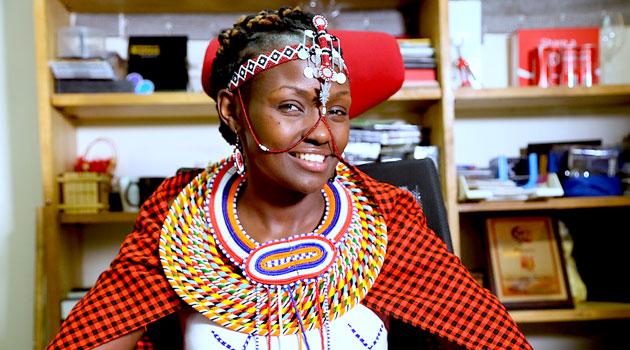NAIROBI, Kenya, Oct 6 – As the world marks the 4th International Day of the Girl Child next Sunday, Samburu County is celebrating the hard work of warriors who have put their lives at risk to save girls from the agony of Female Genital Mutilation (FGM) and the tragedy of child marriages.
It will be a celebration to mark the new beginning of hope for girls rescued from old men who are supposed to be their husbands or girls who escaped the bitter cut that robs them of their childhood and plunges them to life of indecency.
Listening to Josephine Kulea, Founder and Executive Director of Samburu Girls Foundation, one can only hold back tears to imagine the tribulations that girls living in communities trapped in yokes of outdated cultural practices have to endure in the name of graduating to womanhood.
Kulea is not your ordinary kind of woman.
She has braved herself to face off her intolerant community that highly treasures FGM.
Kulea has rescued about 1,000 girls in four counties – Marsabit, Samburu, Laikipia and Isiolo.
North Eastern Kenya where the four counties are located accounts for 97 percent of FGM cases, according to a report published in 2013.
“We rescue the girls and then link them with support. We have NGOs who support these girls, we have the families that are well off who sponsor the girls rescued. Some of the girls are adopted,” she explains.
250 of the 1,000 girls are under the direct care of Kulea’s foundation.
The number however keeps on increasing daily.
“Like now I have just received a text message that I need to rescue three girls. During the teachers’ strike two girls were married off.”
Her efforts to rescue girls are constrained by a myriad of hiccups – the major one being shortage of resources and facilities despite the increasing demand for help.
US President Barack Obama during his recent visit in Kenya recognised Kulea’s dedication to save the girl child from FGM and child marriages.
She has also received several other national and international recognitions including by the United Nations.
Whereas the recognition is good enough to motivate her and also create awareness about her foundation and her work, it has not translated to resources that can augment facilities to rescue the increasing numbers of girls running away from FGM and marriage.
“Before Obama it was little known of us. After Obama so many people got to find out who we are. It’s been a big step, it opened more awareness about what we do but it is yet to translate into funding.”
The help she is so far receiving is like a drop in the ocean.
But she says it is very encouraging to see some communities commit themselves to fight harmful cultural practices. For example, in Losuk Ward, the community has donated 15 acres of land to the foundation to construct a girls’ rescue centre.
“We have had few successes. In that specific area FGM has gone down. The chief is also very strict about FGM, children have gone to school. Losuk is not like other areas of Samburu; we would want to make it an example of an area where the community has changed,” Kulea explains.
Whereas the first priority after saving the girls is to reconcile them with their families, most of them are no longer welcome after refusing to honor wishes of their parents.
“Some of the families are cunning they say ‘ok we’re fine with her let her come back’. They are normally bitter because the dowry has to be refunded. Now that the cows are taken back then for them it’s like to hell with that girl,” Kulea explains.
The Foundation’s aim is to rescue girls before they are cut and also before their dowry is paid to avoid the bitterness of their families having to refund it.
However, in most cases the girls remain vilified by their relatives and are no longer welcome back to their homes. Those are the girls that the foundation caters for or seeks for their adoption.
And on Sunday, Losuk Ward will mark the International Day of the Girl with the opening of a new dormitory expected to house 80 girls.
It will not however be enough to take in the 250 girls under the foundation’s care.
Most of the rescued girls are usually taken to boarding schools. The major headache is where to take them to during school holidays.
The situation is so desperate that the foundation has established a partnership with some schools and parents to accommodate rescued girls during school holidays.
“We agree that over the holiday let these girls accompany some of your girls they go home together. It reduces our burden of paying transport for them to come back to Samburu,” Kulea says.
Kulea’s hope is to give girls threatened by FGM and early marriages education and a home that they can give them a chance to pursue their dreams and ambitions.
She is appealing to well-wishers – local and international – to help the foundation complete the construction of a dormitory that can cater for 300 girls from the four counties.
“You can support us through our PAYBILL NO. 787873 or you can request to sponsor a girl by sending a message on our website www.samburugirls.foundation Contributions can be sent to Samburu Girls Foundation, Account NO. 0100004103933 CFC Bank.”
There will be also a fundraiser on Sunday at Losuk Ward in Samburu County which will be graced by Safaricom Chief Executive Officer Bob Colymore.
Money raised will be used to complete the second phase of the dormitory which is expected to host 300 girls rescued from FGM and marriage.










































